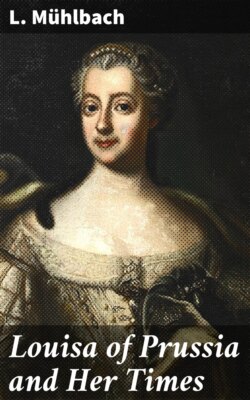Читать книгу Louisa of Prussia and Her Times - L. Muhlbach - Страница 11
На сайте Литреса книга снята с продажи.
Оглавление“Gott erhalte Franz den Kaiser,
Unsern guten Kaiser Franz,
Lange lebe Franz den Kaiser
In des Gluckes hellem Glanz!
Ihm erbluhen Lorbeerreiser,
Wo er geht, zum Ehrenkranz!
Gott erhalte Franz den Kaiser,
Unsern guten Kaiser Franz!”
[Footnote: The celebrated Austrian hymn, “God save the Emperor
Francis.”]
Profound silence prevailed while Haydn was singing, and when he concluded with a firm and ringing accord and turned around, he saw that his wife, overcome with emotion, with folded hands and eyes lifted up to heaven, had sunk down on her knees, and that old Catharine and Conrad were kneeling behind her, while the cat stood between them listening to the music as it were, and even the parrot below seemed to listen to the new hymn, for its screams had ceased.
A smile of delight played on Haydn’s lips and rendered his face again young and beautiful. “Now, sing with me, all three of you,” he said. “Sing loudly and firmly, that God may hear us. I will commence again at the beginning, and you shall accompany me.”
He touched the keys vigorously, and sang once more, “God save the Emperor Francis!” and carried away by the melody so simple and yet so beautiful, the two women and the old footman sang with him the tender and artless words.
“And now,” said Haydn, eagerly, “now, I will write down the melody on the spot, and then you shall run with it to Councillor von Swieten. He must add a few verses to it. And then we will have it copied as often as possible—we will circulate it in the streets, and sing it in all public places, and if the French really should come to Vienna, the whole people shall receive them with the jubilant hymn, ‘God save the Emperor Francis!’ And God will hear our song, and He will be touched by our love, and He will lead him back to us, our good Emperor Francis.”
He sat down at his desk, and in youthful haste wrote down the music. “So,” he said then, “take it, Conrad, take it to Herr von Swieten; tell him it is my imperial hymn. Oh, I believe it will be useful to the emperor, and therefore I swear that I will play it every day as long as I live. My first prayer always shall be for the emperor.” [Footnote: Haydn kept his word, and from that time played the hymn every day. It was even the last piece of music he performed before his death. On the 26th of May, 1809, he played the hymn three times in succession. From the piano he had to be carried to his bed, which he never left again. When Iffland paid him a visit in 1807, Haydn played the hymn for him. He then remained a few moments before the instrument—placed his hands on it, and said, in the tone of a venerable patriarch: “I play this hymn every morning, and in times of adversity have often derived consolation and courage from it. I cannot help it—I must play it at least once a day. I feel greatly at ease whenever I do so, and even a good while afterward.”—“Iffland’s Theatrical Almanac for 1855,” p. 181.]
“And now run, Conrad, and ask Herr von Swieten to finish the poem quickly, and you, women, leave me. I feel the ideas burning in my head, and the melodies gushing from my heart. The hymn has inspired me with genuine enthusiasm; and now, with God and my emperor, I will commence my Creation! But you, you must not despair—and whenever you feel dejected, sing my imperial hymn, and pour consolation and courage into your hearts—into the hearts of all Austrians who will sing it. For not only for you, but for Austria, I have sung my hymn, and it shall belong to the whole Austrian people!”
